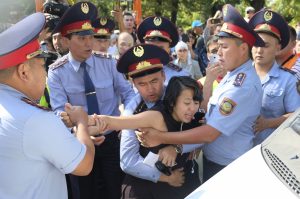On Monday, May 25, Kazakh President Kassym-Jomart Tokayev signed into law legislation aimed at updating Kazakhstan’s protest policies. When the draft of the new law was released in February 2020, it was heavily criticized by rights activists; the final law retains many of the features that had drawn criticism.
The law’s most significant change flips what had been an approval process to a notification process for holding demonstrations. Previously, in order to hold a legal demonstration activists had to seek the state’s permission and it was rarely granted. Under the new law, the organizers of a rally notify the authorities ahead of time.
In April, an array of human rights advocates penned an open letter to Tokayev regarding the protest law. Published by Human Rights Watch, the critique focused in large part on the “Permission vs. Notification” distinction, elements of discrimination, and the restriction of demonstrations to specific spaces. None of these issues were changes significantly in the final law.
There are slightly different procedures for pickets, meetings, and rallies in contrast to demonstrations and processions — the main distinction seeming to be movement of a gathering vs being stationary, with different time frames for notification and approval.
Demonstrations are restricted to sites identified by the authorities; picketing can take place anywhere, in theory, but there are a number of prohibited sites such as mass graves, transport infrastructure, official residences, and defense and security buildings. Furthermore, only legally registered organizations can hold demonstrations, meaning that the authorities still retain control over exactly which groups can hold a legal protest. The new law also retains provisions for authorities to refuse a rally on a range of grounds, including if the state judges the goals of the rally to be “forcibly changing the constitutional order of the Republic of Kazakhstan” or the “incitement” of social, racial, national, religious, and other forms of “hatred.”
Another problematic feature of the new law are stipulations regarding who can actually organize a rally. The organizer must be a Kazakh citizen (or a legally registered group), not a foreigner, and cannot be a citizen who has been convicted of “participating in mass riots, high treason, espionage, extremist and terrorist crimes, [and] violation of the procedure for organizing and conducting peaceful meetings.” This ostensibly prohibits a whole generation of Kazakh activists who have faced repression under previous iterations of the country’s law of protests. It also complicates the prospects for leaderless movements to hold legal rallies. The organizer, or the official representative thereof, has to be present and clearly identified.
At this juncture, the changes appear to be cosmetic. Functionally, the state retains significant influence over who can protest, where, and about what — there are a lot of rules to follow and spontaneous demonstrations remain illegal.
The timing of the change is not optimal. Some have critiqued the state for pushing the law through despite the ongoing pandemic and associated restrictions keeping people from demonstrating or adequately debating the law. The country’s state of emergency was lifted on May 11 and there are stages set out for the lifting of various restrictions, but in Kazakhstan’s larger cities quarantine regimes remain in place.
Large public protests, of the sort seen last summer in Kazakhstan, are hard to imagine in the current pandemic-dominated world. What protesting looks like going ahead could be very different from the demonstrations of the past, and not because of the change in Kazakhstan’s protest law. In sum, Nur-Sultan has avenues to pick and choose which demonstrations occur, undermining the narrative of these changes as true reform and respecting the freedom of speech.
When Tokayev took office last year following the resignation of Nursultan Nazarbayev, he promised continuity. After his own election, in June 2019, he promised change. In a lead article in our upcoming June magazine, Kazakh journalist Aigerim Toleukhanova examines the year since Tokayev took power. One of the features she highlights is the ways in which the transit of power in Kazakhstan has influenced political consciousness; how Tokayev’s reform promises have both opened up space but also demonstrated the constricted nature of political discourse in the country.

































